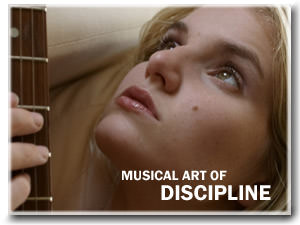
Musical Art of Discipline
I am sure many of us have, at one time or another, started learning a piece of music and stopped practicing before ever having it mastered. There can be numerous reasons for this, but one of the most common is a lack of discipline. Sometimes, it becomes more appealing to put down what we struggle with and begin with something fresh and interesting. Everyone wishes they could begin as a pro rather than starting at square one, however, unless you are a musical prodigy, most of us begin by taking baby steps.
Attention to Detail
Regardless of whether you are an actual student of music or a hobbyist, concentrating on what you are studying is fundamental.
If you are a student, give your instructor your full attention and take notes that will help your playing. Obviously, these notes may not be typical of what you might have in a more "academic" class, but taking notice of certain aspects on sheet music will be a helpful reminder when you are practicing and ultimately performing.
If music happens to be just a hobby, listen carefully to what you are hearing. Make mental note or write down on paper distinguishing characteristics that you believe will help you improve your playing. This consideration of different musical elements will pay dividends in the future and will consent to easier learning when taking on more challenging pieces.
Patience
Learning anything new is difficult and always takes much dedication and determination. By not staying committed, you will develop problems overcoming your confined technical ability and will allow room only for maintenance rather than progression. You will also miss the sense of fulfillment that comes from accomplishing something new and will leave you feeling frustrated. Just like you, even the greatest of artisans had to learn patience and commitment in order to perfect their craft.
Practice Makes Perfect
Practice, practice, practice! Though it can become exasperating and tedious at times, the most effective way to improve your playing is by practicing. Set aside time each day to practice and set reasonable goals for yourself.
For instance, you may be a trumpet player and one area of difficulty is the ability to hit certain notes. Now you are not going to start out like Dizzy Gillespie, but through practice and perseverance, you will be able to meet the goals that you set for yourself.
One common ambition that all musicians aspire to achieve is the ability to play fast tempo music. Initially, you may sit and think to yourself, "There is no way I'll play that fast." Don't worry; instead of biting off more than you can chew, break it down into a few bars at a time and give yourself something easier to work with.
Practicing is the most important part to becoming a better player and sustained dedication is essential.
Conclusion
Remember, Rome was not built in a day. As you strive to improve your skills, keep in mind that you are just like anyone else that has ever attempted something new. If you visualize yourself as the musician you want to become, start out slow, are patient and practice, the frustration that had you giving up will develop into the satisfaction you were striving for all along.

